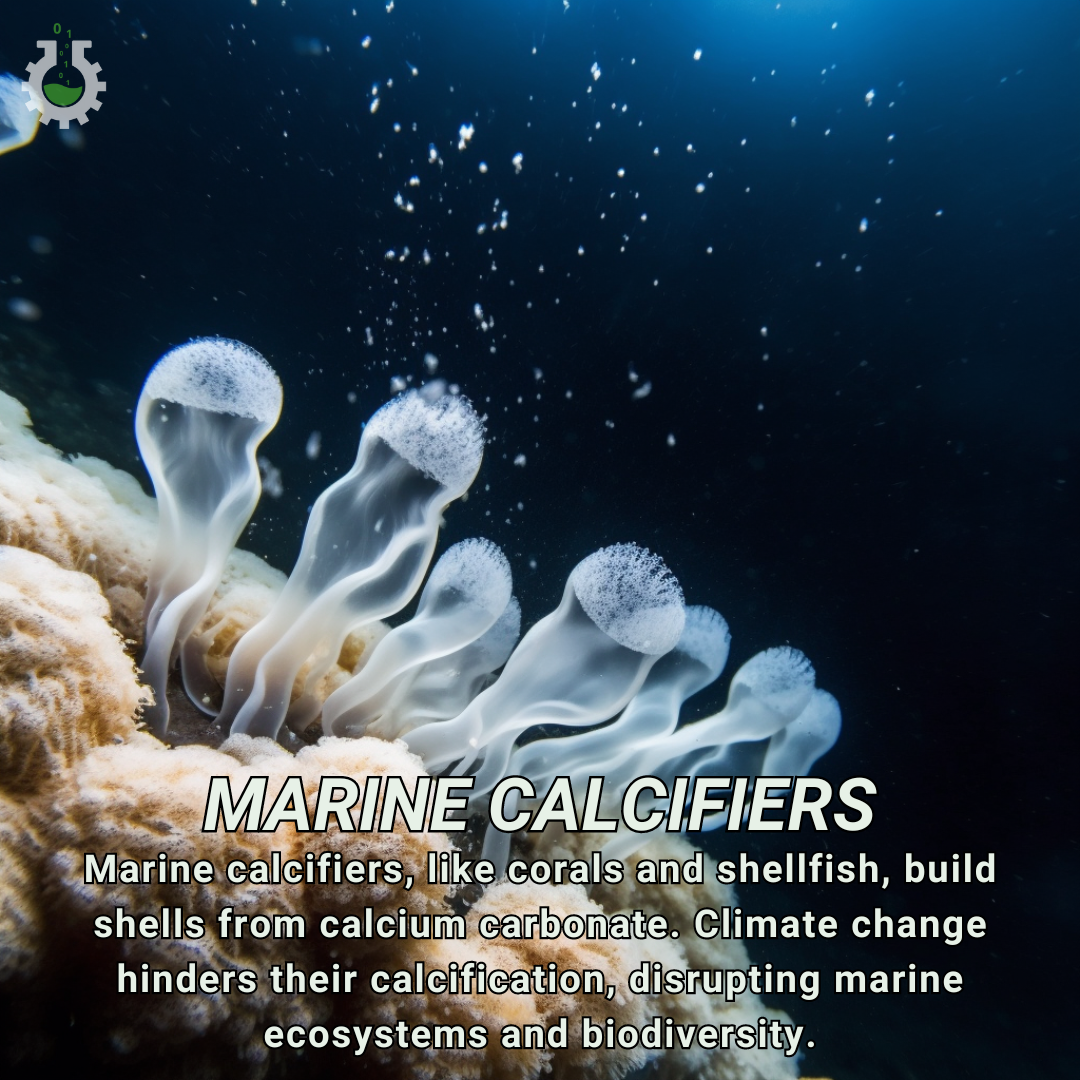June 6, 2024
Climate Change Poster Collection of the Day – Marine Calcifiers
Book a Demo
Today’s Climate Change Poster Collection highlights Marine calcifiers, such as corals, mollusks, echinoderms, and certain types of plankton like coccolithophores, play a crucial role in ocean ecosystems by forming calcium carbonate structures that serve as habitats, protective shells, and essential components of marine food webs. However, climate change poses a severe and multifaceted threat to these organisms through a process known as ocean acidification. As atmospheric carbon dioxide (CO2) levels rise due to human activities like fossil fuel burning, deforestation, and industrial processes, a significant portion of this CO2 is absorbed by the world’s oceans. This absorption leads to chemical reactions that lower the pH of seawater, making it more acidic. The increased acidity reduces the availability of carbonate ions, which are essential for marine calcifiers to build and maintain their calcium carbonate structures. Without sufficient carbonate ions, these organisms face difficulties in forming their shells and skeletons, leading to weakened structures and increased vulnerability to predation, disease, and environmental stressors.
Coral reefs, often referred to as the “rainforests of the sea,” are particularly affected by this phenomenon. These vibrant ecosystems, which support a quarter of all marine species, are experiencing more frequent and severe bleaching events due to both ocean acidification and rising sea temperatures. Bleaching occurs when corals, stressed by warmer waters, expel the symbiotic algae that live within their tissues and provide them with energy through photosynthesis. This not only leads to the loss of the corals’ vibrant colors but also their primary source of nutrition, making recovery difficult and often leading to widespread coral mortality. The decline of coral reefs has profound implications for marine biodiversity, as these structures provide critical habitats and breeding grounds for numerous marine species.
The impact of ocean acidification extends beyond coral reefs. Mollusks, such as oysters, clams, and snails, rely on calcium carbonate to form their shells. As ocean acidity increases, these organisms struggle to maintain their shells, resulting in higher mortality rates and reduced growth. This has significant economic implications, particularly for coastal communities that depend on shellfish industries for their livelihoods. Similarly, planktonic marine calcifiers like coccolithophores, which form the base of many marine food webs, are also affected. These microscopic organisms play a crucial role in carbon cycling and the ocean’s ability to sequester CO2. Their decline could disrupt marine food webs, impacting species that rely on them for survival, including commercially important fish.
The cascading effects of these changes underscore the interconnectedness of marine ecosystems and highlight the urgent need for global efforts to mitigate climate change by reducing CO2 emissions and protecting ocean health. Addressing these challenges is critical to preserving marine biodiversity and the services these ecosystems provide to humanity. This includes food security, as many communities rely on marine species for their primary source of protein; economic stability, through industries like fishing and tourism; and coastal protection, as coral reefs and other marine structures act as natural barriers against storm surges and erosion. Additionally, the decline in marine calcifiers can alter nutrient cycles and biogeochemical processes, further exacerbating the impacts of climate change on the ocean environment. Therefore, concerted global action is essential to mitigate these effects, through strategies such as reducing carbon emissions, protecting marine habitats, and fostering resilience in marine ecosystems. By doing so, we can help ensure the health and sustainability of our oceans for future generations.
Discover an inspiring collection of climate change poster.



